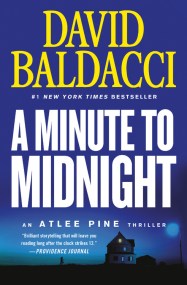By clicking “Accept,” you agree to the use of cookies and similar technologies on your device as set forth in our Cookie Policy and our Privacy Policy. Please note that certain cookies are essential for this website to function properly and do not require user consent to be deployed.
Long Road to Mercy
Contributors
Formats and Prices
- On Sale
- May 28, 2019
- Page Count
- 448 pages
- Publisher
- Grand Central Publishing
- ISBN-13
- 9781538761533
Price
$19.99Price
$25.99 CADFormat
This item is a preorder. Your payment method will be charged immediately, and the product is expected to ship on or around May 28, 2019. This date is subject to change due to shipping delays beyond our control.
Buy from Other Retailers:
Introducing a remarkable new character from #1 New York Times bestselling writer David Baldacci: Atlee Pine, an FBI agent with special skills assigned to the remote wilds of the southwestern United States who must confront a new threat . . . and an old nightmare.
Eeny, meeny, miny, moe. Catch a tiger by its toe.
It’s seared into Atlee Pine’s memory: the kidnapper’s chilling rhyme as he chose between six-year-old Atlee and her twin sister, Mercy. Mercy was taken. Atlee was spared.
She never saw Mercy again.
Three decades after that terrifying night, Atlee Pine works for the FBI. She’s the lone agent assigned to the Shattered Rock, Arizona resident agency, which is responsible for protecting the Grand Canyon.
So when one of the Grand Canyon’s mules is found stabbed to death at the bottom of the canyon-and its rider missing-Pine is called in to investigate. It soon seems clear the lost tourist had something more clandestine than sightseeing in mind. But just as Pine begins to put together clues pointing to a terrifying plot, she’s abruptly called off the case.
Eeny, meeny, miny, moe. Catch a tiger by its toe.
It’s seared into Atlee Pine’s memory: the kidnapper’s chilling rhyme as he chose between six-year-old Atlee and her twin sister, Mercy. Mercy was taken. Atlee was spared.
She never saw Mercy again.
Three decades after that terrifying night, Atlee Pine works for the FBI. She’s the lone agent assigned to the Shattered Rock, Arizona resident agency, which is responsible for protecting the Grand Canyon.
So when one of the Grand Canyon’s mules is found stabbed to death at the bottom of the canyon-and its rider missing-Pine is called in to investigate. It soon seems clear the lost tourist had something more clandestine than sightseeing in mind. But just as Pine begins to put together clues pointing to a terrifying plot, she’s abruptly called off the case.
If she disobeys direct orders by continuing to search for the missing man, it will mean the end of her career. But unless Pine keeps working the case and discovers the truth, it could spell the very end of democracy in America as we know it…
“Love it!” –Lisa Gardner
“Atlee Pine is unforgettable.” –James Patterson
“David Baldacci’s best yet.” –Lisa Scottoline
“Heart-poundingly suspenseful.” –Scott Turow
“A stunning debut.” –Douglas Preston
“A perfect blend of action, secrets, and conspiracies.” –Steve Berry
“Baldacci is at the top of his game.” –Kathy Reichs
“A perfect blend of action, secrets, and conspiracies.” –Steve Berry
“Baldacci is at the top of his game.” –Kathy Reichs
-
"David Baldacci is one of the all-time best thriller authors. LONG ROAD TO MERCY is all action and attitude, and makes no apologies. Love it!"Lisa Gardner, #1 New York Times bestselling author
-
"David Baldacci's best yet. He keeps the pages flying and the plot twisting in this ingenious and riveting thriller. Best of all, he introduces a compelling new heroine in FBI Agent Atlee Pine. I can't wait to see what she does next. Baldacci delivers, every time!"Lisa Scottoline, #1 bestselling author
-
"Long Road to Mercy is David Baldacci at his best, introducing an engrossing new heroine, FBI Agent Atlee Pine. Alternately chilling, poignant, and always heart-poundingly suspenseful."Scott Turow, #1 New York Times bestselling author
-
"An epic thriller-fast moving, beautifully imagined, and vividly set in the Grand Canyon and its environs. From the opening chapter to the final twist, this novel will absolutely transfix you. A stunning debut to what promises to be a great series. Agent Pine is a character for the ages."Douglas Preston, #1 New York Times bestselling author
-
"David Baldacci is a name synonymous with excellence-a consummate storyteller who turns the conventional into unconventional. LONG ROAD TO MERCY strikes all the right chords: a perfect blend of action, secrets, and conspiracies--all combined with Baldacci's trademark sizzle."Steve Berry, New York Times bestselling author
-
"A multi-layered protagonist; a plot as deep and twisty as the setting. In Long Road to Mercy, Baldacci is at the top of his game."Kathy Reichs, #1 New York Times bestselling author
-
"A fabulous new character from a master storyteller. Readers will love Atlee Pine. A mile-a-minute read that proves once again why David Baldacci has readers the world over flocking for more."Jane Harper, New York Times bestselling author
-
"FBI Agent Atlee Pine is a heroine I'll never forget. I hope David Baldacci's hard at work on Agent Pine's next adventure, because I can't wait to dive into it."Tess Gerritsen, New York Times bestselling author
-
"What a blast-off for Baldacci's most memorable protagonist yet--Atlee Pine is a heroine for our times, a fighter for justice we'd all be glad to have on our side. LONG ROAD TO MERCY is a spectacular series debut. I can't wait to see what's next for her."Joseph Finder, New York Times bestselling author
-
"If you're wondering why David Baldacci is considered the best, look no further than LONG ROAD TO MERCY. In FBI Agent Atlee Pine, he has envisioned a new kind of heroine, forged in the fire of trauma and driven by a rare kind of strength. It should come as no shock that a thriller writer for the ages has created a character for the ages!"Gregg Hurwitz, New York Times bestselling author
-
"Baldacci excels as a storyteller...He knows how to craft a complex and compelling case for his stellar heroes to solve. Baldacci is at the top of his game here. The final reveal is both exciting and shocking. Readers will fall in love with Atlee, and hopefully Baldacci will bring her back soon."Associated Press
-
"Baldacci weaves an intricate tale full of action, adventure and intrigue... Baldacci's latest page-turning thriller lives up to his reader's expectations and beyond."Killer Nashville
-
"Baldacci at his finest."Dearborn Press & Guide
Newsletter Signup
By clicking ‘Sign Up,’ I acknowledge that I have read and agree to Hachette Book Group’s Privacy Policy and Terms of Use











